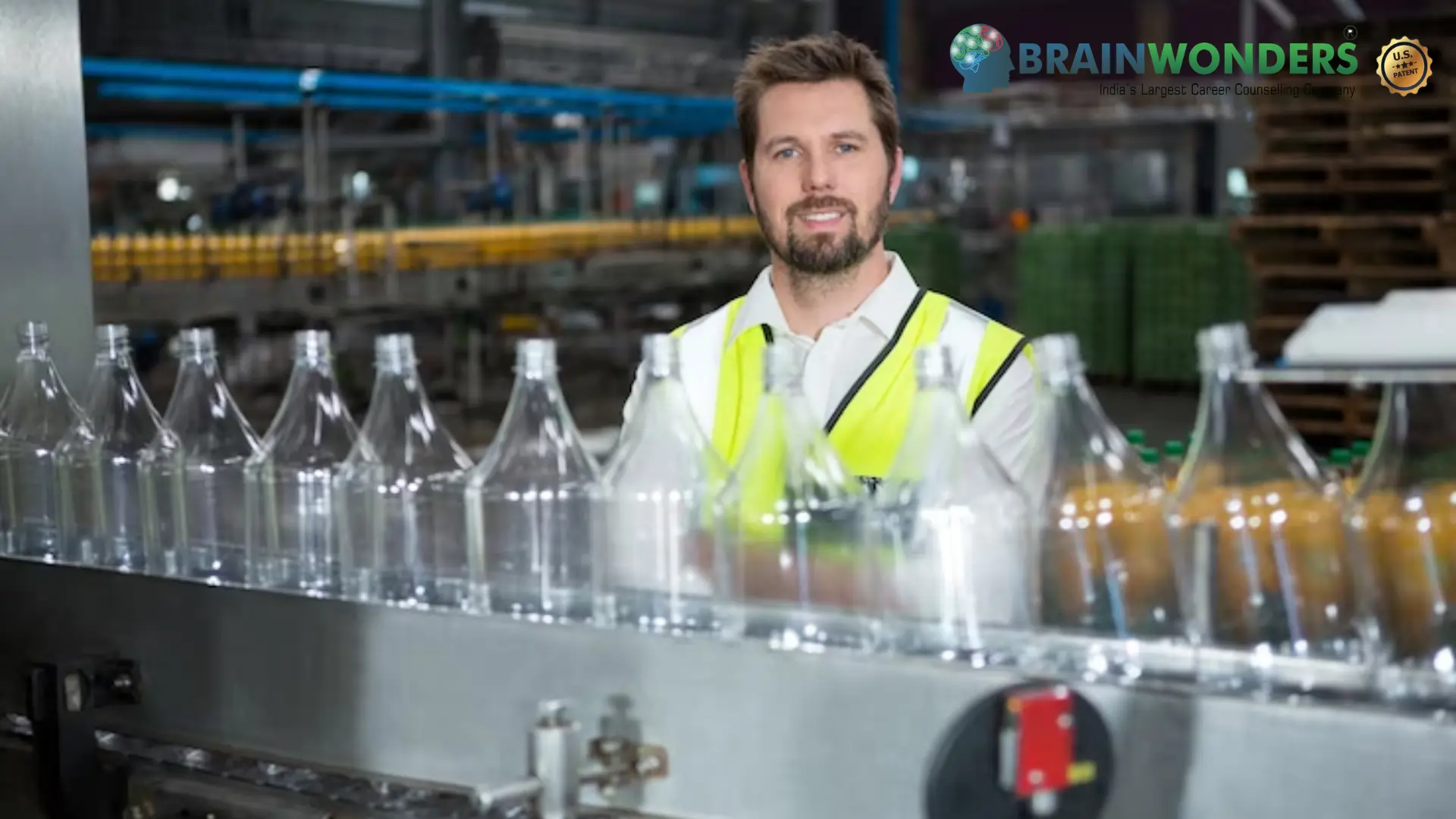How to become a Plastic Processing Operator
Overview, Courses, Exam, Colleges, Pathways, Salary

Overview
Who is Plastic Processing Operator ?
Operators of plastic processing machines set up and run plastic mixing, calendering, extruding, and moulding equipment used in the production of plastic components and products. Studies specifications, make arrangements for materials, tools, and equipment, and directs the setup of machines, tools, dies, moulds, and other equipment based on the kind of product to be produced. Makes a trial piece, inspects it for dimensions, shape, and composition, and makes any required changes to guarantee compliance with stipulated requirements. They are in charge of managing the plastic and granule requirements, as well as setting up and running the moulding machines and shaping and completing the finished product. They assist Printing Machine Operators, clean and finish moulded plastics products and perform a variety of routine and low-skilled tasks in the manufacturing of plastics products, such as arranging and loading plastics or plastics impregnated sheets, assisting Printing machines Operators, and so on.
Typical day at work
What does Plastic Processing Operator do?
A Plastic Processing Operator is responsible for operating machinery and equipment used to manufacture and process plastic products. Their main tasks revolve around setting up, running, and monitoring the plastic processing machines to ensure smooth and efficient production. Here are the key responsibilities and duties of a Plastic Processing Operator:
- Machine Setup: Plastic Processing Operators prepare the machines for production by setting up the molds, calibrating the equipment, and adjusting settings according to the plastic product's specifications.
- Material Handling: They load plastic raw materials into hoppers or feeding systems, ensuring a steady supply to the processing machines.
- Operation and Control: Operators monitor the plastic processing machines during production to ensure they run smoothly and without interruptions. They control the machine's speed, temperature, pressure, and other variables to achieve the desired product quality.
- Quality Assurance: Plastic Processing Operators conduct regular quality checks on the products, inspecting for defects and adjusting to maintain consistent quality standards.
- Troubleshooting: When issues arise, operators troubleshoot and resolve minor equipment malfunctions and process problems to minimize downtime and maintain productivity.
- Maintenance: They perform routine maintenance on the machines to keep them in good working condition, and they may assist maintenance technicians with repairs as needed.
- Safety Compliance: Operators adhere to safety protocols and guidelines to ensure a safe working environment and prevent accidents during production.
- Record Keeping: They maintain production records, including data on machine settings, production output, and quality control checks.
- Cleaning and Housekeeping: Plastic Processing Operators keep the work area clean and organized, ensuring a safe and efficient workspace.
- Team Collaboration: They may work as part of a production team, collaborating with supervisors, quality control personnel, and other operators to meet production targets and deliver high-quality products.
- Process Improvement: Operators may suggest process improvements and efficiency-enhancing measures to optimize production and reduce waste.
Abilities and Aptitude needed
What are the skills, abilities & aptitude needed to become Plastic Processing Operator?
To become a successful Plastic Processing Operator, individuals need a combination of abilities, skills, and aptitudes to excel in their role. Here are some critical attributes required for a career as a Plastic Processing Operator:
- Technical Aptitude: Plastic Processing Operators should have a natural inclination and aptitude for understanding mechanical processes and operating machinery used in plastic processing.
- Attention to Detail: Precision is crucial in plastic processing to ensure the quality and consistency of the products. Paying close attention to details helps in avoiding defects and maintaining high standards.
- Mechanical Skills: Good mechanical skills are essential to effectively operate and troubleshoot various plastic processing machines and equipment.
- Physical Stamina: The job of a Plastic Processing Operator may involve standing for long periods and handling heavy materials, so physical stamina is necessary to perform the tasks efficiently.
- Problem-Solving Abilities: Plastic Processing Operators should possess strong problem-solving skills to address machine malfunctions, identify issues in the production process, and make necessary adjustments.
- Manual Dexterity: The ability to work precisely and handle small components and tools is vital for a Plastic Processing Operator.
- Safety Awareness: Plastic processing involves working with potentially hazardous machinery and materials, so a solid commitment to safety protocols and practices is crucial.
- Analytical Thinking: Analyzing data and monitoring the production process helps make informed decisions and maintain optimal processing conditions.
- Communication Skills: Effective communication is essential for collaborating with team members and supervisors, especially when coordinating tasks and addressing production-related issues.
- Adaptability: The plastic processing industry may involve working with various plastics and processing methods, so being adaptable to different situations and materials is beneficial.
- Quality Control: Plastic Processing Operators should have a strong sense of quality control to ensure that the final products meet the required standards.
- Learning and Curiosity: Staying updated with the latest plastic processing technologies and materials helps continuously improve skills and knowledge in the field.
Salary
Salary for Plastic Processing Operator?
Salary of Plastic Processing Operator is as follows :
- Minimum Monthly Salary: The minimum monthly salary for an entry-level Plastic Processing Operator in India could range from INR 10,000 to INR 15,000 or more.
- Maximum Monthly Salary: Highly experienced and skilled Plastic Processing Operators, especially those in senior positions or with specialized expertise, may earn a monthly salary ranging from INR 30,000 to INR 50,000 or more.
- Annual Salary: The minimum annual salary for an entry-level Plastic Processing Operator in India could be approximately INR 1.2 lakhs to INR 2.5 lakhs per year. Highly experienced and skilled Plastic Processing Operators, especially those in senior positions or with specialized expertise, may earn a maximum yearly salary ranging from INR 3 lakhs to INR 6 lakhs or more.
- Highest paying jobs and scope: The highest paying job for a Plastic Processing Operator in India is often found in specialized roles such as Senior Plastic Processing Operator, Tooling Specialist, Quality Control Manager, Production Supervisor, or Research and Development (R&D) positions. These roles require extensive knowledge, experience, and expertise in plastic processing techniques, tooling design, quality control, production supervision, or innovation. The scope for Plastic Processing Operators in India is promising due to the wide range of industries that rely on plastic products, including packaging, automotive, electronics, and consumer goods. With increasing demand for plastic products and a focus on sustainability and recycling, operators with expertise in eco-friendly plastic processing and recycling may have expanded career opportunities.
Pathways
How to become an Plastic Processing Operator?
Entrance Exam
Entrance Exam for Plastic Processing Operator ?
Courses
Which course I can pursue?
Best Colleges
Which are the best colleges to attend to become an Plastic Processing Operator?
Industries
Which Industries are open for Plastic Processing Operator?
A Plastic Processing Operator can find opportunities in various industries that manufacture and produce plastic products and components. Some of the sectors open for a Plastic Processing Operator include:
- Plastics Manufacturing: Plastic processing operators are employed in plastic products manufacturing companies. These may include companies producing plastic containers, bottles, packaging materials, and various consumer goods.
- Injection Molding: Injection molding is an ordinary plastic processing technique used to create a wide range of products, including automotive parts, medical devices, and electronic components. Plastic processing operators are essential in operating injection molding machines.
- Blow Molding: Blow molding produces hollow plastic products, such as bottles, containers, and tubes. Plastic processing operators work in blow molding facilities to set up and operate the machinery.
- Extrusion: Plastic extrusion is the process of shaping plastic by forcing it through a die to create continuous profiles, tubes, and sheets. Operators work in extrusion plants to control the extrusion machines.
- Thermoforming: Thermoforming involves heating plastic sheets and forming them into various shapes. Plastic processing operators run the thermoforming machines and ensure the quality of developed products.
- Packaging Industry: Plastic processing operators can work in companies that produce plastic packaging materials, including plastic films, bags, and pouches.
- Automotive Industry: In the automotive sector, plastic processing operators produce plastic components used in cars, such as dashboards, bumpers, and interior trim.
- Consumer Electronics: Plastic processing operators may find opportunities in companies that manufacture plastic parts for electronic devices, such as phone cases, computer housings, and accessories.
- Medical Device Manufacturing: Some plastic processing operators work in the medical device industry, producing plastic components for various medical equipment and devices.
- Toys and Recreation: Plastic processing operators may work in companies that produce plastic toys, sports equipment, and recreational products.
internship
Are there internships available for Plastic Processing Operator?
Internships for a Plastic Processing Operator may be available in industries related to plastics manufacturing, injection molding, blow molding, extrusion, and other plastic processing sectors. These internships provide valuable hands-on experience and practical training for individuals pursuing a career in plastic processing. Here are some potential avenues for finding internships:
- Plastics Manufacturing Companies: Large and small-scale plastics manufacturing companies may offer internships to students or individuals interested in learning about the plastic processing industry.
- Plastic Processing Equipment Suppliers: Companies that supply plastic processing machinery and equipment may offer internships to students or individuals interested in understanding the operation and maintenance of these machines.
- Research and Development Labs: Some research institutions and R&D labs focused on plastic materials and processing may offer internships to individuals looking to gain insights into the latest advancements in the field.
- Trade Associations: Industry trade associations or organizations related to plastics processing may have internship programs to support aspiring professionals in the field.
- Educational Institutions: Technical or vocational schools and colleges with plastic processing programs may have internship partnerships with local companies.
- Networking and Online Job Platforms: Networking with professionals in the plastic processing industry and searching online job platforms can help individuals find internship opportunities.
Career outlook
What does the future look like for Plastic Processing Operator?
The career outlook for Plastic Processing Operators appears promising, driven by the continuous demand for plastic products in various industries. As economies grow and industries expand, the need for plastic materials and products is expected to remain steady. However, the future of Plastic Processing Operators may also be influenced by certain factors.
Automation and technological advancements in plastic processing machinery may change the nature of the job. Operators must adapt to new technologies and acquire skills in operating advanced equipment. The industry's focus on sustainability and environmental concerns also leads to a growing interest in eco-friendly materials and processes. Plastic Processing Operators with knowledge of sustainable practices and recycling methods may have an advantage.
Human supervision and control will remain vital for quality assurance and troubleshooting despite some automation. Operators with strong problem-solving abilities and attention to detail will remain valuable assets to manufacturing companies.
Overall, the career prospects for Plastic Processing Operators remain stable, and their skills will be in demand to support the production of a wide range of plastic products essential to modern living. Staying updated with technological advancements and embracing sustainable practices will ensure continued success in this dynamic industry.



